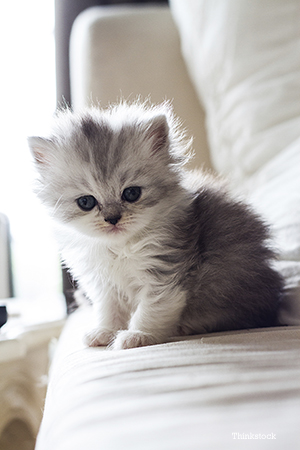
Dr. Phil Zeltzman is a traveling, board-certified surgeon in Allentown, PA. His website is www.DrPhilZeltzman.com. He is the co-author of “Walk a Hound, Lose a Pound” (www.amazon.com).
Kelly Serfas, a Certified Veterinary Technician in Bethlehem, PA, contributed to this article.
During a “kitten visit,” your veterinarian is likely to discuss vaccinations, heartworm prevention, deworming and neutering. Are you aware of the main reasons to neuter a kitten?
Definition of “neuter”
Neutering or castration is the removal of both testicles. Occasionally, one or both testicles may be “retained” or “undescended” in a cryptorchid cat. Testicles that stayed in the belly should be removed to prevent testicular torsion (a painful condition where the testicle twists on itself) or even testicular cancer (the risk is much higher when it stays inside the belly). Neutering a kitten, which requires taking certain precautions while under anesthesia, is considered safer than neutering an adult because kittens tend to bounce back quicker. Most veterinarians recommend neutering kittens before 6 months of age.
Neutering to avoid spraying
The smell of intact cat urine is one of the nastiest smells out there. Intact cats mark their territories by urinating (“spraying”). It’s an instinct, and there is no way to avoid this behavior. The simplest way to eliminate the foul smell is to neuter your kitten.
Neutering to avoid roaming
Intact males are more likely to wander around, get hit by a car, end up lost or get into a fight. They can smell a female in heat miles away, and sometimes will do anything to check her out. This can lead to countless undesirable encounters.
Neutering to avoid kittens
Every time your cat procreates with a female, there is a chance that 4, 6 or more kittens will be brought into this world. Within your own family, this may be a wonderful experience. Sadly, multiplied by many cats in many cities and states, this seemingly benign event leads to what is called overpopulation. In turn, this leads to countless stray cats and millions of unwanted cats euthanized at shelters every year, nationwide.
In addition, unless your kitten is a perfect representative of the breed, there is a possibility of spreading genetic conditions such as heart disease, eye conditions and kidney disease.
Neutering to avoid aggressiveness
Neutered cats tend to be less aggressive, and are less likely to get into a fight. One of the most common injuries veterinarians see after a cat fight is the classic “cat abscess,” which is a painful and nasty condition that requires surgery.
Neutering to avoid prostate diseases
Diseases of the prostate are rare in cats. But it’s good to know that after a cat is neutered, the prostate shrinks, which virtually eliminates the risk of several diseases such as infection and cysts. Interestingly, neutering a cat seems to slightly increase the risk of prostate cancer, but fortunately that’s still exceedingly rare in cats.
Neutering to avoid testicular cancer
Testicular tumors are rare in cats. The easiest way to completely eliminate the risk of testicular cancer or benign testicular tumors is to simply neuter a kitten. If an intact, adult cat were diagnosed with a testicular tumor, the treatment would require neutering, which typically provides a cure because this tumor rarely spreads or metastasizes.
As you can see, there are many reasons to neuter a kitten. A few benefits have to do with his behavior, while most are related to his future health. Neutering a kitten is a smart and inexpensive way to avoid diseases and future veterinary expenses and to provide a lifetime of benefits.
Questions to ask your veterinarian:
- When is the best time to neuter my kitten?
- What precautions are taken during anesthesia?
- What is the postop care at home?
If you have any questions or concerns, you should always visit or call your veterinarian -- they are your best resource to ensure the health and well-being of your pets.
